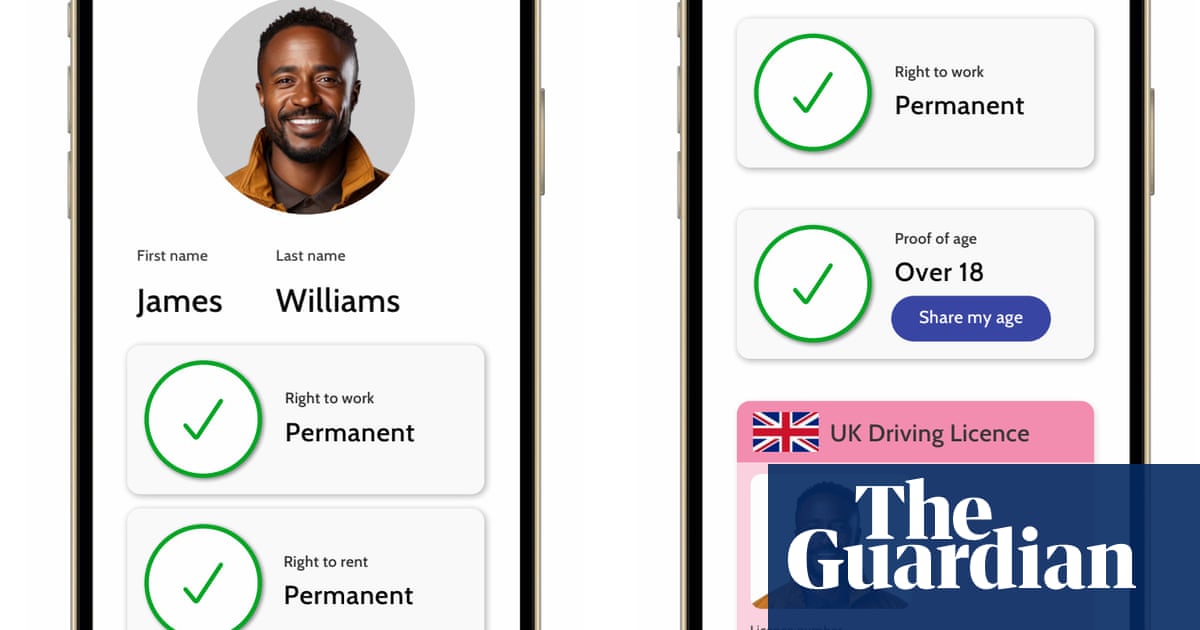Downing Street is exploring new proposals for a digital ID card to crack down on illegal migration, rogue landlords and exploitative work, set out in a policy paper authored by a centre-left thinktank.
The paper has been handed to the No 10 policy unit to flesh out proposals for a BritCard, which would be a mandatory digital credential thatLabourTogether claims could help avoid another Windrush scandal.
But it said it would also help reduce vast numbers of visa overstayers, saying half of those whose asylum claims were turned down over the past 14 years were likely still to be in the UK.
It proposes a free, secure digital ID, stored on a person’s smartphone using ministers’ planned gov.uk Wallet app, rebranded as the BritCard app. That could then be verified by employers, immigration, banks and landlords using a free verifier app.
The proposal from the thinktank, whose founders include the No 10 chief of staff Morgan McSweeney, has been backed previously by dozens of Labour MPs, with the new paper endorsed by two “red wall” MPs, Jake Richards and Adam Jogee.
The analysis in the paper found that the ID cards – a hugely controversial policy proposalduring Tony Blair’s era– would make right-to-rent and right-to-work checks quicker and easier for tenants and employees.
The paper said that it would cost up to £400m to build the system and around £10m a year to administer as a free-to-use phone app. Labour Together said that as well as helping to tackle illegal migration, it would also have a progressive benefit of giving people a clear way of proving they belonged in the country.
It said previous projects, such as the NHS app and EU settled status, despite some problems, had nevertheless proven such a project was possible with satisfaction from the majority of users.
In their foreword, Richards, the MP for Rother Valley, and Jogee, the MP for Newcastle-under-Lyme, said the BritCard “should form an important part of Labour’s enforcement strategy that does not compromise our principles and values”.
They said that those living in the UK without regular status were “exploited by criminal employers, which in turn suppresses wages for legal citizens and migrants alike”. They said the coalition government’s “hostile environment” had made very little difference to the overall numbers but had had a disproportionately cruel effect on those unfairly targeted.
“The Windrush scandal saw thousands of people wrongly targeted by immigration enforcement, including many legitimate British citizens who were unjustly detained or deported,” they said. “We believe that a progressive government does not have to choose between dealing with these injustices. It must tackle them all head on.”
They said the introduction of a digital ID for all citizens was “progressive because it gives our residents and citizens the cast-iron guarantees they have not previously had. This is your country. You have a right to be here. This will make your life easier. It is at the heart of the social contract.”
Morgan Wild, Labour Together’s chief policy adviser, said: “The state makes everyone, whether they are a British citizen or not, prove their right to work or rent.
“But we don’t give everyone with the right to be here the ability to prove it. That leads to discrimination, unjust deportation and, as happened in the worst Windrush cases, dying in a country that is not your own. Through a national effort to provide everyone with proof of their right to be here, BritCard can stop that from ever happening again.”
The Home Office has already committed in its immigration white paper to rolling out a digital identity for all overseas citizens through eVisas and new systems for checking visa compliance, replacing the former residence permit cards.
The paper argues that landlords are rarely fined for failing any checks on migration status and that proving status can be very difficult for people without a passport or recent bills, especially young people.
Sign up toHeadlines UK
Get the day’s headlines and highlights emailed direct to you every morning
after newsletter promotion
It argued that employers faced high costs and complex right-to-work rules, which varied for British nationals and different categories and migrants – and said this would give employers a simple way to confirm migration status and speed up hiring.
The report’s author and the thinktank’s director of technology, Kirsty Innes, said: “A progressive society can only work if we have meaningful borders. BritCard would make it far harder to flout the illegal work and illegal rent rules, and far easier to identify and punish exploitative illegal employers and landlords.”
Polling for the report found that more than 70% of Britons and supporters of each political party backed the digital ID concept.
The Windrush scandal meant that thousands of people who were living legally in the UK were mistakenly classified as immigration offenders, with many losing their jobs, homes and access to healthcare and benefits as a result; a smaller number were arrested, detained and deported to countries they had left as children.
But immigration experts were uncertain about whether the scandal would have been averted by an ID card system, pointing out that many of those affected had asked the Home Office to give them documentation.
Mihnea Cuibus, researcher with the Migration Observatory at the University of Oxford, said the challenge would be working out how to “onboard” people who were currently outside the immigration system. “A fully functioning and up-to-speed system could work well in avoiding Windrush-type situations. The question is how would we get there in practice?”
He was uncertain whether a BritCard would have a practical impact on reducing illegal immigration. Employers and landlords are required to check the immigration status of new tenants and employees, and face large fines if they rent or employ people without the right to be in the UK. However, there is very little enforcement action.
Cuibus said the size of the underground economy in France, where ID cards were mandatory, was not very different from in Britain.
